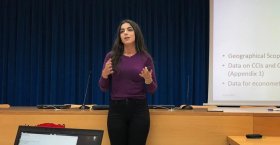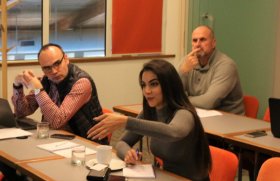Lina Maddah Souheil


PhD Programme: Economics and Business
Research group: QURE – Quantitative Urban and Regional Economics
Supervisor: Josep Maria Arauzo Carod
Bio
Lina Maddah holds a Bachelor's Degree in Economics from the American University of Science & Technology (Lebanon) and a Master's Degree in Economics from Beirut Arab University (Lebanon). She is at the Department of Economics at Universitat Rovira i Virgili (URV). Her work deals with the dynamics of Cultural and Creative Industries, their economic contribution in Catalonia, in addition to their spatial distribution and clustering patterns. Throughout her first and second years in the PhD programme, she has participated in several national and international economic platforms which deal with smart specialization, economic geography, urban economics and regional sciences.
Project: Essays on Cultural and Creative Industries: Clustering, Location and Employment Growth
This thesis contributes to the contemporary discussion on the economic role of CCIs. First, the thesis explores the impact of specialization in CCIs on total employment growth between 2001 and 2011 at a local level in Catalonia. Departing from a baseline OLS specification and then applying a Quantile Regression (QR), findings reveal that specialization in some CCIs boosts employment but only for high-growth municipalities (in terms of employment). Second, the thesis investigates the Functional Urban Area of Barcelona (FUAB) more closely, in terms of clustering patterns of CCIs using a SaTScan method which is a novelty in the investigation of industrial agglomeration. The main results suggest that CCIs firms tend to cluster, especially in core or urban areas. Still, there are diffences in the preferences of firms based on their knowledge bases and the role of periphery areas is highlighted. Within the context of cluster lifecycle, the findings identify emerging and mature clusters between 2009 and 2017. This is a novel finding from cluster lifecycle analysis that can have profound policy implications. Third, the thesis helps to develop a more complete picture of the effects of CCIs by investigating whether the existence of a CCIs cluster can modulate the location decisions of firms (CCIs and Non-CCIs) in FUAB.
Open Access publications
International secondment
- Organisation for Economic Co-operation and Development (OECD), France and Italy. 3 months (2019).
- University of Illinois, USA. 2 months (2019).
Outreach activities
- European Researchers’ Night 2020: “Cultural and Creative Industries in Catalonia”.
Prizes & Awards
- Best communication, Slovak Winter Seminar on Regional Science (2019).
News
- Diari Digital de la URV: PhD fellow Lina Maddah receives an award at the Slovak Winter Seminar on Regional Science



